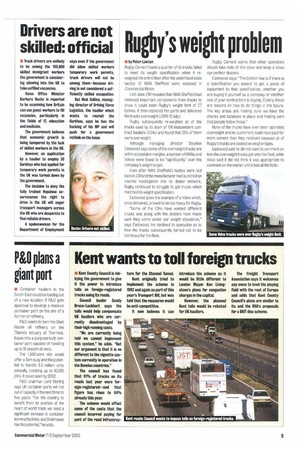I'S weight problem
Page 7

If you've noticed an error in this article please click here to report it so we can fix it.
• by Peter Lawton Rugby Cement found a quarter of as trucks failed to meet its weight specification when it reweighed the entire fleet after the underhand sales tactics of MAN Sheffield were exposed in Commercial Motor.
Last June CM revealed that MAN Sheffield had removed important components from trucks to show a could meet Rugby's weight limit of 7.7 tonnes. It then replaced the parts and delivered the trucks overweight (CM6-12 July).
Rugby subsequently re-weighed all of the trucks used by its team of 106 independent contract hauliers (ICHs) and found that 25% of them were overweight.
Although managing director Stephen Eastwood says some of the overweight trucks are within acceptable margins, a number of MANS and Volvos were found to be "significantly" over the company's weight target.
Even after MAN Sheffield's tactics were laid bare in CMand the manufacturer had launched an internal investigation into its dealer network, Rugby continued to struggle to get trucks which matched its weight specification.
Eastwood gives the example of a Volvo which, once delivered, proved to be too heavy for Rugby "Some of the ICHs have wanted different trucks and along with the dealers have made sure they come under our weight stipulation," says Eastwood. He declined to speculate as to how the trucks subsequently turned out to be too heavy for the fleet. Rugby Cement warns that other operators should take note of this issue and keep a close eye on their dealers.
Eastwood says: "The bottom line is if there is a specification you expect to get a piece of equipment to that specification, whether you are buying it yourself as a company or whether one of your contractors is buying. Clearly these are lessons on how to do things in the future. The key areas are making sure we have the checks and balances in place and making sure that people follow those."
None of the trucks have ever been operated overweight and no customers could have paid for more cement than they received because all of Rugby's trucks are loaded on weighbridges.
Eastwood said he did not want to comment on how the overweight trucks got onto the fleet, while Volvo said it did not think it was appropriate to comment on the matter until it had all the facts.
















































































































